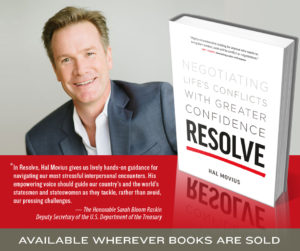 Negotiation expert Hal Movius published a book, Resolve: Negotiating Life’s Conflicts with Greater Confidence  and has immediately gained nationwide attention. Hal’s book comes at a time when anxiety is high, and relationships, in and out of the workplace have another layer of potential for conflict. This week, Hal teaches us how to turn confrontation at work into productivity. From the article:
Negotiation expert Hal Movius published a book, Resolve: Negotiating Life’s Conflicts with Greater Confidence  and has immediately gained nationwide attention. Hal’s book comes at a time when anxiety is high, and relationships, in and out of the workplace have another layer of potential for conflict. This week, Hal teaches us how to turn confrontation at work into productivity. From the article:
“People who think of themselves as pretty cooperative tend to avoid or give in when they’re up against more powerful counterparts at work. But the fact is that using confrontation in these situations isn’t about getting aggressive or being pushy. Do it right, and it becomes a subtle technique for prodding your counterpart back to the table. With a little resolve and a willingness to wade into conflict rather than shrink from it, you can actually build more collaborative partnerships than you’d otherwise think.”
I’m learning a lot from Resolve and from Hal’s work. Learning techniques for successful negotiation and perhaps more importantly, building one’s confidence to deal with work issues is something just about everyone needs.


